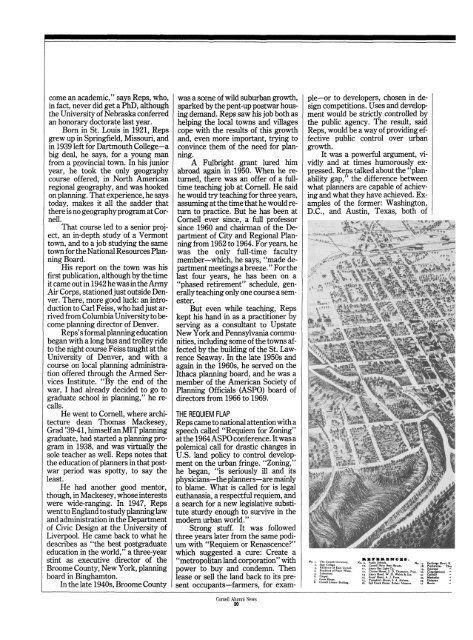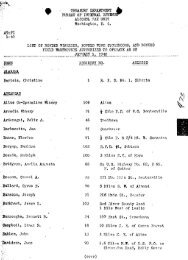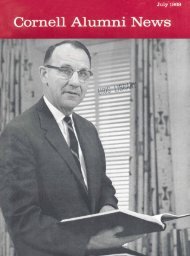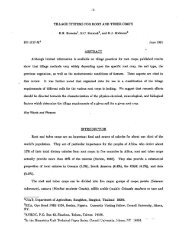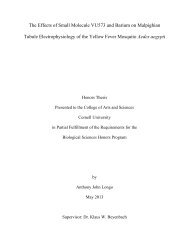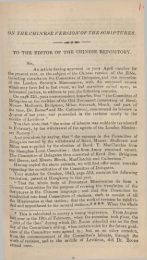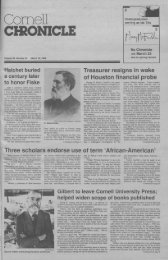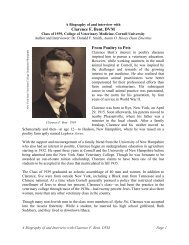City Views - eCommons@Cornell - Cornell University
City Views - eCommons@Cornell - Cornell University
City Views - eCommons@Cornell - Cornell University
Create successful ePaper yourself
Turn your PDF publications into a flip-book with our unique Google optimized e-Paper software.
come an academic/' says Reps, who,<br />
in fact, never did get a PhD, although<br />
the <strong>University</strong> of Nebraska conferred<br />
an honorary doctorate last year.<br />
Born in St. Louis in 1921, Reps<br />
grew up in Springfield, Missouri, and<br />
in 1939 left for Dartmouth College—a<br />
big deal, he says, for a young man<br />
from a provincial town. In his junior<br />
year, he took the only geography<br />
course offered, in North American<br />
regional geography, and was hooked<br />
on planning. That experience, he says<br />
today, makes it all the sadder that<br />
there is no geography program at <strong>Cornell</strong>.<br />
That course led to a senior project,<br />
an in-depth study of a Vermont<br />
town, and to a job studying the same<br />
town for the National Resources Planning<br />
Board.<br />
His report on the town was his<br />
first publication, although by the time<br />
it came out in 1942 he was in the Army<br />
Air Corps, stationed just outside Denver.<br />
There, more good luck: an introduction<br />
to Carl Feiss, who had just arrived<br />
from Columbia <strong>University</strong> to become<br />
planning director of Denver.<br />
Reps' s formal planning education<br />
began with a long bus and trolley ride<br />
to the night course Feiss taught at the<br />
<strong>University</strong> of Denver, and with a<br />
course on local planning administration<br />
offered through the Armed Services<br />
Institute. "By the end of the<br />
war, I had already decided to go to<br />
graduate school in planning," he recalls.<br />
He went to <strong>Cornell</strong>, where architecture<br />
dean Thomas Mackesey,<br />
Grad '39-41, himself an MIT planning<br />
graduate, had started a planning program<br />
in 1938, and was virtually the<br />
sole teacher as well. Reps notes that<br />
the education of planners in that postwar<br />
period was spotty, to say the<br />
least.<br />
He had another good mentor,<br />
though, in Mackesey, whose interests<br />
were wide-ranging. In 1947, Reps<br />
went to England to study planning law<br />
and administration in the Department<br />
of Civic Design at the <strong>University</strong> of<br />
Liverpool. He came back to what he<br />
describes as "the best postgraduate<br />
education in the world," a three-year<br />
stint as executive director of the<br />
Broome County, New York, planning<br />
board in Binghamton.<br />
In the late 1940s, Broome County<br />
was a scene of wild suburban growth,<br />
sparked by the pent-up postwar housing<br />
demand. Reps saw his job both as<br />
helping the local towns and villages<br />
cope with the results of this growth<br />
and, even more important, trying to<br />
convince them of the need for planning.<br />
A Fulbright grant lured him<br />
abroad again in 1950. When he returned,<br />
there was an offer of a fulltime<br />
teaching job at <strong>Cornell</strong>. He said<br />
he would try teaching for three years,<br />
assuming at the time that he would return<br />
to practice. But he has been at<br />
<strong>Cornell</strong> ever since, a full professor<br />
since 1960 and chairman of the Department<br />
of <strong>City</strong> and Regional Planning<br />
from 1952 to 1964. For years, he<br />
was the only full-time faculty<br />
member—which, he says, "made department<br />
meetings a breeze.'' For the<br />
last four years, he has been on a<br />
"phased retirement" schedule, generally<br />
teaching only one course a semester.<br />
But even while teaching, Reps<br />
kept his hand in as a practitioner by<br />
serving as a consultant to Upstate<br />
New York and Pennsylvania communities,<br />
including some of the towns affected<br />
by the building of the St. Lawrence<br />
Seaway. In the late 1950s and<br />
again in the 1960s, he served on the<br />
Ithaca planning board, and he was a<br />
member of the American Society of<br />
Planning Officials (ASPO) board of<br />
directors from 1966 to 1969.<br />
THE REQUIEM FLAP<br />
Reps came to national attention with a<br />
speech called ' 'Requiem for Zoning"<br />
atthe 1964 ASPO conference. Itwasa<br />
polemical call for drastic changes in<br />
U.S. land policy to control development<br />
on the urban fringe. ''Zoning,"<br />
he began, "is seriously ill and its<br />
physicians—the planners—are mainly<br />
to blame. What is called for is legal<br />
euthanasia, a respectful requiem, and<br />
a search for a new legislative substitute<br />
sturdy enough to survive in the<br />
modern urban world."<br />
Strong stuff. It was followed<br />
three years later from the same podium<br />
with "Requiem or Renascence?"<br />
which suggested a cure: Create a<br />
"metropolitan land corporation" with<br />
power to buy and condemn. Then<br />
lease or sell the land back to its present<br />
occupants—farmers, for example—or<br />
to developers, chosen in design<br />
competitions. Uses and development<br />
would be strictly controlled by<br />
the public agency. The result, said<br />
Reps, would be a way of providing effective<br />
public control over urban<br />
growth.<br />
It was a powerful argument, vividly<br />
and at times humorously expressed.<br />
Reps talked about the "planability<br />
gap," the difference between<br />
what planners are capable of achieving<br />
and what they have achieved. Examples<br />
of the former: Washington,<br />
D.C., and Austin, Texas, both of<br />
8. <strong>Cornell</strong> Library Building.<br />
Public Scho<br />
No<br />
<strong>Cornell</strong> Navy Boat Houses.<br />
Ithaca Gas Light Co.<br />
Clinton House, S. D. Thompson, Prop.<br />
Ithac, Hotel, W. H. Welch & Son.<br />
Frees' Hotel, A. J. Free .<br />
Tompkin Home, S. A. Holmes.<br />
Fall Creek House. Robert Fohnirnn<br />
Presbyterian<br />
Episcopal<br />
Congregational<br />
<strong>Cornell</strong> Alumni News<br />
20


